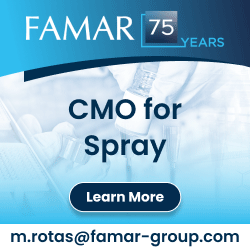Looking for spray formulations for topical & nasal delivery? Find contract manufacturers offering nasal sprays & topical sprays on PharmaCompass.
Q1. What are nasal and topical sprays and what are their components?
Medical sprays are defined as a jet of liquid in fine drops, coarser than a vapor, which is produced by forcing the liquid from a minute opening of an atomizer and mixing it with air.
Nasal and Topical Spray:
- Nasal Sprays
A nasal spray is a substance dispensed as a fine spray from a container into the nostril. The anatomy and physiology of the intranasal cavity provide unique advantages for accessing targets for local, systemic, and potentially central nervous system drug delivery.
Nasal spray devices are readily available in the marketplace in unit dose and metered multi-dose formats. Furthermore, nasal spray formulations may be aqueous, hydroalcoholic, or nonaqueous-based solution, suspension, or emulsion systems. Nasal drug delivery systems have various advantages including improved bioavailability, rapid onset of action, ease of administration, improved convenience, etc.
Nasal spray components depending on the type of nasal drug formulations include active ingredients, solvents, cosolvents, mucoadhesive agents , pH buffers, antioxidants, preservatives, osmolality and tonicity agents, penetration enhancers, suspending agents, surfactants, etc.
- Topical Spray
Topical sprays are dosage forms in which polymeric solution of drug is sprayed over the intact skin so as to get a sustained release of drug from the polymeric matrix.
Topical drug delivery systems (TDDS) are gaining popularity and several drugs have been successfully delivered by topical/transdermal route for both local and systemic action.Topical formulations may be administered via aerosol foams or spray devices, solutions with pressurized propellants.
Topical sprays offer many advantages compared to conventional topical preparations because they can provide uniform drug distribution and doses, increased bioavailability, lower incidences of irritation, continuous drug release, and accelerated wound healing through moisture control.
Some common topical spray components depending on the type of formulation include medicaments, film formers, vehicles, permeation enhancers, solubilizers, plasticizers, water soluble additives, etc.
Leading pharmaceutical and medical device contract manufacturers (e.g. Contract Manufacturing Organization or CMO for nasal and topical sprays) have started developing new spray products such as topical and nasal spray products that optimize processes and meet their partners’ business objectives. Leading organizations, CDMO and CMO for nasal and topical sprays are explored in detail further below.
Q2. What are the critical parameters affecting nasal spray formulation performance?
Some Critical Parameters Affecting Nasal Spray Formulation Performance:
- Droplet Size
During the approval of new drugs, investigation of droplet size distribution verifies the bioavailability as well as the bioequivalence of generic drugs. Spray applicators should be designed in a way that an optimal droplet size distribution (20 µm to 80 µm) is targeted at a desired dosing volume. A measurement of droplet size distribution under controlled conditions is recommended during the drug product development of the aerosol as well as during quality control to guarantee the therapeutic effect of a formulation applied via a nasal spray.
- pH and Buffer
Local pH in the intranasal cavity may have a direct effect on the rate and extent of absorption of ionizable nasal drug products. Therefore, it is imperative to control the pH and buffer concentrations of nasal spray formulations. Furthermore, nasal secretions may alter the pH of the administered dose which can affect the concentration of un-ionized nasal drug products available for absorption. Therefore, an adequate formulation buffer capacity may be required to maintain the pH in-situ.
- Osmolality
Similar to pH, the osmolality of the vehicle affects local tolerance and the current state of the drug (ionized, nonionized). Osmolality should whenever possible be adapted to the physiological situation. Higher values are tolerable for emergency or single use applications, isotonic conditions for chronic use, etc.
- Viscosity
Viscosity of the nasal spray has an impact on spray characteristics such as droplet size and spray geometry and the nasal deposition. Therefore the viscosity of the formulation is critical in retaining the drug in the intranasal cavity for long enough to achieve sufficient absorption. Hence there is a requirement to increase the viscosity of the formulation to improve adsorption.
- Excipient Selection
It is known that excipients, and their level in nasal drug formulations, influence the physical properties of the formulation, including viscosity and surface tension. These, in turn, can critically influence the spray pattern and droplet size distribution of the product. Nasal spray formulation excipients are thus selected carefully and may adjust properties such as pH, viscosity, solubility and stability of the nasal drug formulations.
- Spray Pattern and Plume Geometry
Spray pattern and plume geometry analysis and characterisation during drug product development is a regulatory requirement for metered dose inhalers, dry powder inhalers and other unit dose nasal spray drug products. Plume geometry and spray pattern from dry powder devices is also required for release testing. Spray pattern and plume geometry measurement systems are designed to provide an automatic, objective measurement of the shape, size and duration of the spray from nasal spray products or devices.
Q3. What are the different nasal spray devices for liquid formulations?
In nasal delivery, nasal sprays seem to be the most promising nasal drug delivery devices for both local and systemic disease therapy. There are three common types of nasal spray devices including unit-dose, bi-dose, and multi-dose nasal spray drug delivery devices. These nasal drug delivery device types are explored in detail below.
- Unit-dose Nasal Delivery Device
In a unit-dose nasal device, the liquid formulation is contained in a stoppered glass vial. When the drug delivery device is actuated, a needle within the body of the actuator pierces the stopper, the stopper is depressed, and the nasal spray is expelled through the needle.
The formulation properties and automated actuation parameters affect the spray characteristics of unit dose nasal spray devices. During method development, various actuation mode techniques are used to determine these actuation parameters.
- Bi-dose Nasal Delivery Device
A bi-dose nasal device is for single-use, is pre-filled, already-assembled, and disposable. It is ideal for urgent use treatments. With the bi-dose device, two separate actuations are required to expel the entire product. The actuation mechanism comes to a stop after approximately half of the vial has been dispensed so that the other half can be dispensed into the other nostril.
- Multi-dose Nasal Delivery Device
A multi-dose nasal device is ideal for chronic-use medicines. Each device is already-assembled and pre-filled with many doses for an extended period of use (e.g., a month, season). Multi-dose nasal spray devices should be discarded after they are consumed.
Developing a successful multi-dose nasal spray drug product is challenging. A number of components and critical parameters need to be precisely controlled to achieve precise dose delivery such as viscosity and surface tension.
There are various contract manufacturers, CDMOs, CMOs (Contract Manufacturing Organizations) that offer development of nasal dosage forms, clinical and commercial manufacturing, along with nasal drug delivery devices and production of nasal spray products including uni-dose, bi-dose and multi-dose nasal spray devices.
Q4. Which are the different companies offering pharmaceutical contract manufacturing for nasal and topical sprays?
The global nasal spray market is slated to witness accelerated growth with increasing regulatory approvals for newer nasal spray drug products.
Some of the leading contract manufacturers - CMO (Contract Manufacturing Organization), CDMO - offering drug delivery solutions, development of nasal dosage forms, and pharmaceutical contract manufacturing (clinical and commercial manufacturing) of nasal and topical sprays, nasal solutions and semi-solid products are noted below.
CDMO, CMO for Nasal and Topical Sprays:
Catalent Pharma Solutions - Contract Manufacturing for Nasal Spray
Catalent offers the development of inhaled products and the full commercial-scale manufacturing of DPIs, MDIs and unit-dose or bi-dose nasal sprays. It provides complete, end-to-end solutions for today’s handheld inhalation dose forms.
Catalent has in-depth expertise and significant investment in talent and technologies across the entire inhalation field. Its nasal spray services include dosage form development, product testing, clinical and commercial manufacturing, etc.
Fermion Oy - Topical Spray Manufacturing and Nasal Spray Manufacturing
Fermion, through its mother company Orion, is an experienced contract manufacturer of various dosage forms such as topical and nasal sprays, non-sterile liquids, suspensions, drops (e.g. nasal spray drops), rectal enemas, semi-solid products, etc.
Fermion’s liquid formulation contract manufacturing services include solution, suspension, drops, nasal spray drops, and nasal spray dosage forms. It serves as a CMO for nasal and topical sprays and also offers packaging in glass, plastic and spray dose bottles.
JGL d.d - Production Of Sterile Mechanical Sprays
JGL offers development of nasal dosage forms, sterile drops, sterile sprays (for nose, throat, ear, for topical application) and bag on valve technology (for nose, throat, topical application) on a commercial scale. JGL also offers semi-solid products, sterile topical sprays (for nose and throat), sterile drops for nose (e.g. nasal spray drops, nasal solutions) and eyes, etc.
The line consists of modern dosing machines of sterile mechanical sprays in volumes of 10 to 30 ml. JGL’s sterile mechanical spray services include manufacturing capabilities (commercial scale), packaging presentations and formats in GMP facilities.
Pharmalink, S.L. - Production of Nasal Spray Products
Pharmalink is a young and dynamic company based in Barcelona focused on drug product development offering drug delivery solutions and manufacture of innovative medical devices and food supplements.
Its specialties include nasal sprays, nasal solutions, nasal aspirators, saline solution sprays, oral sprays, ear sprays, medical devices (e.g. nasal drug delivery devices), sea water, food supplements, and health products.
Curida AS - Nasal Spray
Curida’s core competency is in state-of-the-art manufacturing of sterile liquid formulations based on unit-dose Blow-Fill-Seal (BFS) technology, ensuring a high quality, fast and robust process. They are also experienced in the pharmaceutical contract manufacturing (clinical and commercial manufacturing) of nasal spray and bottled products.
Global Pharma CM Sp. z o. o - Sprays and Atomizers
Global Pharma is a contract manufacturer of products in the form of sprays and atomizers with the status of medical devices Class I and dietary supplements. They provide drug delivery solutions with comprehensive production services related to the preparation of recipes, production of trial series, and production of finished products on a commercial scale.
All Suppliers












 Bora Pharmaceuticals- Making success more certain.
Bora Pharmaceuticals- Making success more certain.












